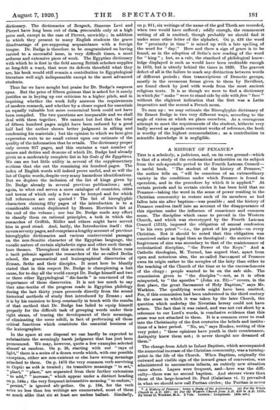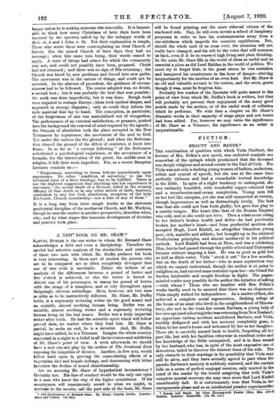A HISTORY OF PENANCE.*
THIS is a scholarly, a judicious, and, on its own ground—which is that of a study of the ecclesiastical authorities on its subject from the sub-apostolic period to the Fourth Lateran Council- s useful book. "The student of the history of Penance," the author tells us, "will be conscious of an extraordinary variety in the conditions under which Penance is found in operation, and in the procedure by which it is applied." At certain periods and in certain circles it has been held that no Penance—taking the word in the sense of power residing in the Christian community to restore such of its members as had fallen into sin after baptism—was possible; and the history of Penance resolves itself into an account of the disappearance of this rigorism under the influence of conscience and common sense. The discipline which came to prevail in the Western Church, and which was stereotyped by the Fourth Lateran Council (1215), imposed the obligation of annual confession "to his own priest "--i.e., the priest of his parish—on every Christian. But it should be noted that this obligation was conceived rather as legal than as theological : the motive of the forgiveness of sins was secondary to that of the maintenance of ecclesiastical discipline, "the Power of the Keys." And a Catholic theologian, M. Turmel, has argued that, apart from open and notorious sins, the so-called Sacrament of Penance owes its origin rather to the scruples of the laity than either to the teaching of the Church of the time or to the encroachments of the clergy : people wanted to be on the safe side. The commission given to "the disciples "—not, as it is often misquoted, to "the apostles" (John xx. 23)—" covers, in the first place, the great Sacrament of Holy Baptism," says Mr. Watkins. The qualifying words might have been omitted. For, if this commission had been understood in the third century in the sense in which it was taken by the later Church, the question which underlay the Novatian heresy could not have arisen. The fact that it was raised, and was not cut short by a reference to our Lord's words, is conclusive evidence that this sense was not attached to them. It is a common error to read into the Christianity of the first centuries the beliefs and institu- tions of a later period. "No, no," says Hooker, writing of this very point ; "these opinions have youth in their countenance. Antiquity knew them not ; it never thought nor dreamed of them."
The change from Adult to Infant Baptism, which accompanied the numerical increase of the Christian community, was a turning- point in the life of the Church. When Baptism, originally the outward and visible sign of the inward grace of conversion, was administered to unconscious infants, an entirely new situation came about. Lapses were frequent, and—here was the diffi- culty—there was no second baptism. And sterner views than those of the large-hearted St. Paul (Galatians vi. 1) prevailed in what we should now call Puritan circles ; the Puritan is never
• A History of Penance: being a Study of the Authorities. (a) For the Whole Church to A.D. 450; (b) For the Western Church from A.D. 450 to A.D. 1215. By Oscar D. Watkins. ILA. 2 Vols. London: Longman's. [42s. net)
happy unless he is making someone else miserable. It is lament- able to think how many Christians of later days have been haunted by the spectres called up by the unhappy words of Heb. vi. 4 and 1 John v. 16. Yet their explanation is simple. Those who wrote them were contemplating an ideal Church of Saints. For the mixed Church of later days they had no message ; when this came into being, their words ceased to apply. A state of things had arisen for which the community was not, and could not possibly have been, prepared. Christ had not returned ; and there was no sign of His returning ; the Church was faced by new problems and forced into new paths. The movement was in the nature of things, and could not be arrested. In the absence of precedent, the guidance of circum- stances had to be followed. The course adopted was, no doubt,
a second best ; but it was probably the best that was possible : the work was done imperfectly, but it was done. Rough tools were required to reshape Europe ; ideas took unideal shapes, and appeared in strange disguises ; only so could they inform the rude material that lay to hand. The conception, in particular,
of the forgiveness of sins was materialized out of recognition. The performance of an external satisfaction, or penance, pushed into the background the renewal of mind required by the apostle ; the formula of absolution took the place occupied in the New Testament by repentance, the movement of the soul to God. Yet under the embers the fire glowed ; and when the Reforma- tion cleared the ground of the debris of centuries, it burst into flame. In so far as "a corrupt following" of the Reformers substituted a psychological experience, or the acceptance of a formula, for the intervention of the priest, the middle-man in religion, it left their work imperfect. For, as a recent Bampton Lecturer reminds us :—
"Forgiveness, according to Jesus, follows immediately upon repentance. No other 'condition of salvation,' to use the technical term of a later theology, has to be fulfilled. There is not the slightest suggestion that anything else but repentance is necessary—the actual death of a Saviour, belief in the atoning efficacy of that death or in any other article of faith, baptism, confession to any but God, absolution, reception of the holy Eucharist, Church membership—not a hint of any of these."
It is a long way from these simple truths to the elaborate penitential discipline of the mediaeval Church, and Mr. Watkins, though he sees the matter in another perspective, describes when, why, and by what stages this immense development of doctrine and practice took place.



































 Previous page
Previous page